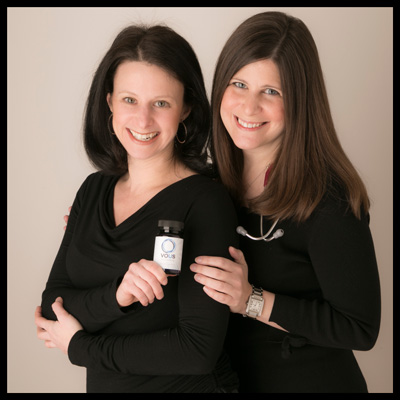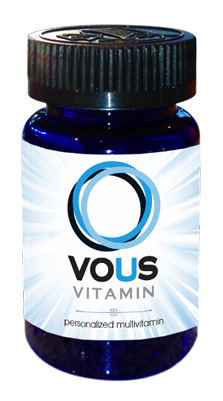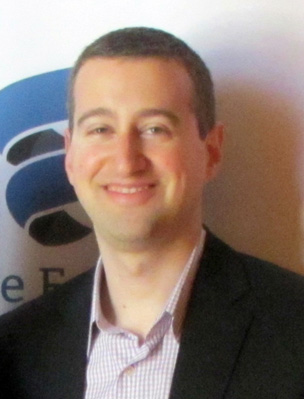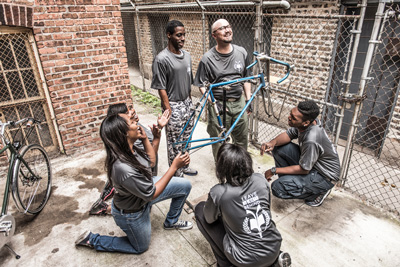8 Questions for Drs. Romy Block and Arielle Levitan: The vitamin experts
Permanent link
Dr. Arielle Levitan (left) and Dr. Romy Block (right), creators of Vous Vitamin.
Take your vitamins, Oy!sters, because this time, it’s personal.
Drs. Romy Block and Arielle Levitan are two doctors (and friends) practicing on the North Shore and changing the way consumers think about vitamins and supplements. That’s right, the days of Flinstones chewable vitamins are long gone. Time to wise up.
Levitan, a board-certified internal medicine physician with a special interest in women’s health and preventative medicine, and Block, a board-certified endocrinology and metabolism specialist and expert in pituitary and thyroid disorders, teamed up to create Vous Vitamin after years of advising patients about the right vitamins to take because off-the-shelf products were not meeting their needs. They found that everyone has different lifestyles, diets and health histories, and they should receive a multivitamin tailored to specifically to them.
Consumers take a short survey online that takes into account age, where they live, their exercise habit, family history, diet (kosher is an option!) and more. It generates a customized multivitamin that can be ordered right online and delivered to your door.

Block and Levitan are also always keeping up on the latest studies and sharing their wisdom on their blog. They even recently gave viewers some advice for self-care during the holidays on the WCIU show “Now.Chicago.”
So if you’re mindful of your health, Romy Block and Arielle Levitan are two Jews you should definitely know.
1. Were you always interested in vitamins and supplements? What drew you pursue this project together?
Arielle: As physicians, we both found that we were spending a great deal of our time talking to patients about vitamins and supplements. We both found that people were very confused about what they should be taking and what was safe and useful. As a primary care doctor, I was often discussing the use of vitamins for osteoporosis prevention and general health.
Romy: I found I was seeing lots of people who thought they had a thyroid problem but in reality had various vitamin deficiencies causing them symptoms.
2. Why aren’t personalized, customizable vitamins commonplace in the industry and how does Vous Vitamin address those challenges?
We have not found many personalized vitamins in the industry, perhaps because the prevailing assumption is that more is better. Many people just add product after product to address different concerns without taking into consideration the person's diet or other factors. It turns out that many people are actually getting too much of vitamins they don't need that can be harmful and not enough of those that they do. Vitamin A, for example is found in most multivitamins, yet deficiency in this is extremely rare in the U.S. Taking too much, on the other hand has been linked to osteoporosis and high rates of cancer. The industry has not addressed this at all.
3. Why might/should young adults who don’t take vitamins and don’t even have them on their radar be considering them?
Many adults need vitamins even if they eat a healthy diet. Some vitamins are not easily obtained from food sources. For example, Vitamin D is found in very few foods in significant amounts (namely beef liver and wild caught salmon—not farm raised). It is obtained from the sun, but most of us who live in temperate climates do not get good year-round sun exposure and many of us wear sunscreen (as we should). Most of us need to supplement D for these reasons. We also often fall short on certain other nutrients, in part because our produce no longer has the same quantities of nutrients that it once did. Some of us, in the name of health, actually miss out on valuable nutrients, such as iodine; this is something that table salt contains. However, as a society people are using less salt and some are using only sea salt or kosher salt which has no iodine. Iodine is essential for thyroid health and should be supplemented, but only in the proper amounts. Many of us also need things like calcium to help keep bones strong. It is, of course, very individual and that is why Vous Vitamin came into being.
4. What are the highlights and challenges of being friends and business partners?
It was via our friendship that our concept for Vous Vitamin developed – we would often discuss our practices and needs of our patients. We realized we had similar views on many health topics and this has carried through to collaborating in our business. We collaborate well, but have found that we each are naturally suited to different roles in running the business. We have also been able to help one another when our home lives are particularly chaotic. We have each had challenges this year with ill family members and I think our friendship beyond the business has enabled us to each sense when the other needs a break from work and we have been able to help pick up the slack. The biggest challenge has perhaps been taking time to remember to connect as friends and not just business partners. Every once in a while we have to remind ourselves to schedule a lunch or night out as couples with our husbands so that we are not just talking business all the time. We try to remember we are friends first.
5. If you could make your vitamins in any form, shape or color, what would they look like?
Our goal is to be able to make vitamins in more different forms – we know some people want chewables or gummies and we know that some people are interested in liquid versions. We hope to eventually develop new products to meet these needs. In addition to our existing Situational Supplements (Power Up for energy and exercise, Immune Blast and Recovery Act for hangover prevention), we hope to introduce many more. We are also working on a dedicated line of men's Personalized Multivitamins since our branding has been tailored to women thus far. We are constantly thinking of adjustments and new ideas based on current research.
6. What do you love most about what you do?
We love being able to apply all our years of medical training and taking care of patients to creating products and a business model that is available to anyone online. It is so much fun to know that our knowledge can benefit so many people. In addition to supplying people with Personalized Multivitamins to meet their specific needs we also like educating them about health topics. We have a very active blog on our site with lots of up to date information on different issues. We are also in the process of writing a book about the role of vitamins in health and wellness.
7. In an alternate universe where you couldn’t be doctors, what would you do?
If we were not creating vitamins we would probably find some other way to help the public become more knowledgeable about their health. We really enjoy translating confusing medical language into concepts anyone can understand. We also like to help people sift through all of the conflicting and misleading information on the internet about health so they can know what to believe. That is in part the origin of Vous Vitamins: we were tired of people showing up in our offices with bags full of supplements that they were taking for unclear reasons and with potentially toxic effects. We felt we could help them clear the clutter and take what was necessary and safe for them.
8. What’s your favorite Jewish thing to do (or how do you Jew?) in Chicago?
Arielle: My favorite Jewish thing is my involvement with Camp Ramah in Wisconsin. I have been a camp doctor there for the last three summers and absolutely love to get away to the North Woods and soak up the energy of summer camp. It's an amazing organization and I feel so privileged to get to be a part of it and live and work in a thriving Jewish community. I’m also is on the Board of Directors at North Suburban Synagogue Beth El where I’m an active member.
Romy: I love participating in the Beth El preschool community. My children have all attended and I serve on the board for the Paul S. and Sylvia Steinberg Preschool. I love that my children have found a Jewish connection so early in life including their enjoyment of the PJ Library each month. I’m an active member in JUF and am looking forward to the YLD Big Event Fundraiser with Seth Meyers!






.jpg)



